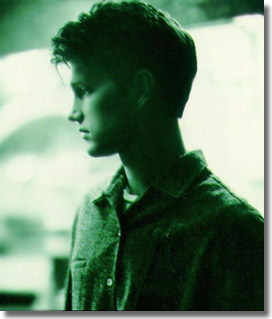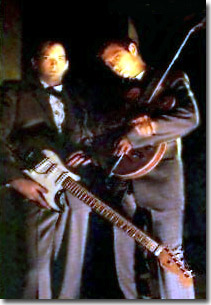
"Oh no, another pile of records from Warner Bros," Zoë moans to herself, "Who would've thought I'd ever get tired of listening to music?" But the truth is, after only a year-and-a-half in the biz, Zoë has discovered that the vast majority of new releases are not worth listening to, and having to do so has become almost a chore. This, from someone who loves music with a passion, someone who feels as though she'll have a nervous breakdown without music, someone whose whole life is wrapped around music. "It's no wonder that only 15% of the bands that are signed even so much as break even," she reflects as she starts to play her way through the pile of new releases.... Ah, but this time, she's lucky, this time there are actually two good records, one of which is some unknown, Elvis look-alike named, improbably, Chris Isaak. Zoë grabs the phone, dials the head of Publicity at Warner Bros in LA (well, Burbank, actually): "Les!" Zoë exclaims excitedly, "Good shit, this Chris Isaak. Who is he?" Les is always happy to get Zoë's support, since she publishes Artist Magazine, which is very popular and influential in the Bay Area, so he quickly fills her in: "Born June 26, 1956, in Stockton, California," Les intones, "Isaak began performing after he graduated from college, forming the rockabilly band Silvertone. The group, which featured guitarist James Calvin Wilsey, bassist Rowland Salley, and drummer Kenney Dale Johnson, has become the singer/guitarist's permanent supporting band. Isaak released his first album, Silvertone, on Warner Brothers Records in 1985....." "Never heard of it," Zoë interrupts. "Well," Les continues, unperturbed, "it was critically well-received, yet it didn't sell. Now we've released the eponymous LP with a picture we hope will attract initial attention. By the way," Les adds almost as an afterthought, "the band is based in San Francisco these days." San Francisco is a real international city, probably the most "European" of all US cities, but because it sits at the tip of a long and narrow peninsula on the San Francisco Bay, and is bounded on three sides by water and on the fourth by another city (South San Francisco), it remains quite small in area. But going back to the Sixties, hippies and ace promoter Bill Graham, San Francisco has had a large contingent of musicians, and this being a very friendly, supportive subculture, everyone hangs around in the clubs, socializes and goes to everyone else's shows. It's an absolutely perfect environment for someone like Zoë, and one night the inevitable happens at The Stone, a club on Broadway—the infamous North Beach street that runs from where it crosses Columbus (home of City Lights, founded in 1953 by beat poet laureate Lawrence Ferlinghetti) down past the strip joints and the huge, elevated sign featuring Carol Doda, topless dancer, and her neon-lit nipples, to the music clubs Mabuhay and The Stone, before dipping under the elevated Embarcadero Freeway and winding up at dockside on the very western edge of the US. So, one night Zoë's hanging out at The Stone and someone introduces her to Chris Isaak. "Oh, hey, I love your album," Zoë says truthfully ('cause she finds it impossible to say so otherwise). And of course Chris is pleased. They chat for a bit, he tells her how he grew up in Stockton, a hot and dusty town in the middle of California's great San Joaquin Valley, which runs for hundreds of miles down the middle of the state. "Oh, yeah," Zoë replies vaguely, "I went through there once on the way to Yosemite—all I remember is, it's really brown, everything is brown, the land, the buildings, the people..." Chris laughs. "OK, it might seem like a silly question, since there's nothing of interest in Stockton, certainly no music scene, but why San Francisco?" "For the surfing," Chris maintains, though surfing in the Pacific Ocean off San Francisco is not what you would think, not at all like those beach movies based in LA. Up north here, the waves can be pretty good but it is bone-chillingly cold, even in a wet-suit, even in the dead of summer. Zoë catches Chris performing in the local clubs, where he and his band, still called Silvertone, play every chance they can get, even at tiny clubs that hold less than 100 people. "He's a great performer," Zoë can quickly see, a born front man, not just as a singer but as a performer. "Indeed, this guy could be a stand-up comic! I'm sure he's going to be a star. I can see that aura...." One night at the I-Beam, the hip underground club on Haight Street—in the heart of what is left of the hippie era, where there are zombied homeless kids all over the streets, interspersed by more Hare Krishna devotees than you ever suspected existed in all the country—Chris comes in with Howie Klein, head of 415 Records, to see Einstürzende Neubauten, the avant garde industrial band from Germany. Chris hangs around Zoë even after Howie wanders off, "Probably because of the way I'm dressed tonight," Zoë thinks to herself, "but I wonder for how long. I can't see Chris Isaak appreciating this kind of music!" And indeed, it's not long into their set of banging on "found instruments" (read: stuff salvaged from a local junk yard),. punctuated by Blixa Bargeld's guitar scratching and high-pitched howling in German, before Chris yelps, "Oh, my God, what a nightmare," and beats a hasty retreat from the club. Time passes, the band keeps playing the little clubs, Zoë hears that John Fogerty (Credence Clearwater Revival) is in the Warners headquarters in Burbank and hears the record playing, and tells management they'd damned well better promote this guy!... but still Chris Isaak barely scrapes into the Top 200, then dies. More time passes and Zoë begins to think that this time she must've been wrong. "Weird," she muses, "when I see that light it always means they'll make it (albeit only for one record sometimes). But, I suppose I could've been wrong this time. Too bad."
More times passes and the band's still playing local clubs in San Francisco, then Zoë gets an assignment from Guitar World magazine to write a small article on Jimmy Wilsey, the guitarist. She goes to the club at sound check time to interview him. But, it's virtually impossible because Chris will not stop trying to be the center of attention, constantly interrupting. What's funny on stage is not funny when trying to interview someone else. Besides, she senses serious tension, picks up a few little clues dropped here and there, that all is not well between Chris and Jimmy. Still not getting the story she needs, and getting very frustrated because if she blows this first assignment from this magazine, she won't get a second chance, Zoë finally turns to Chris and snaps: "Would you please shut up! This is not your interview, it's Jimmy's!" Startled, Chris backs off, but only for a few moments. "Grrrr," Zoë thinks to herself as she leaves, "the editor is going to be pissed off, I couldn't get the technical info I had to have for this interview. And what's more, I'm sure after what I just did, Chris Isaak will never speak to me again either! If he ever does make it, that will most definitely count against me. Oh, well, can't win 'em all...." But as she trudges out of the club in her new dress with the zipper all the way down the front, from the throat to the bottom hem, Chris comes up to her and says with a twinkle in his eye: "Do you know what that dress does to men?" Relief flooding her 'cause she knows now all is forgiven, Zoë tosses her head and with a matching twinkle retorts: "Of course. Why do you think I bought it?" And of course, as we all now know (thanks to "Baby Did a Bad, Bad Thing" in Eyes Wide Shut), Zoë's hunch that Chris Isaak would become a star has finally proven true. It just took a lot longer than expected. |

